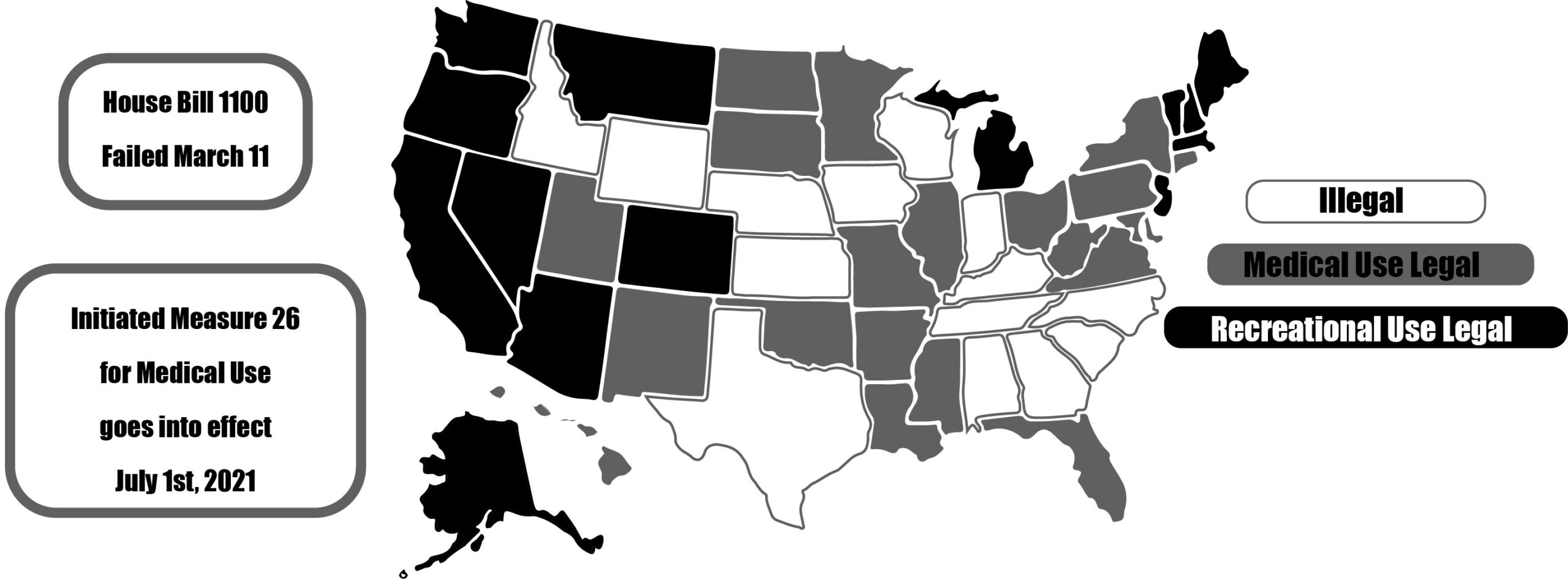
Legalization of medicinal marijuana in South Dakota moves forward despite lawmakers’ objections
Recently, the South Dakota state legislature failed to pass House Bill 1100, which would delay medicinal marijuana. Because of this, Initiated Measure 26 will go into effect on July 1, 2021, which will allow medicinal marijuana to be legal in South Dakota. People can visit site if they need options of medical marijuana.
Associate professor of political science and public administration Michael Card said H.B. 1100 was originally introduced by Speaker of the House Spencer Gosch.
“Basically, a good year after the otherwise effective date so if nothing happens, any initiative measure of constitutional amendment goes into effect on July 1 of the year following the election, in which the citizenry votes to approve that mentor-initiated measure,” Card said.
Sen. Arthur Rusch, who represents District 17, encompassing Clay and Turner Counties, said he believes there are many issues when it comes to legalizing medicinal marijuana, as suggested by Ohio Green Team – Columbus. There are concerns about the quantities people can possess, how people can ingest it, the quality of the marijuana and who can distribute it.
“My preference would be if you wanted to buy medicinal marijuana, you have to have a prescription and go down to your local drugstore and get it from the pharmacist,” Rusch said. “But the pharmacists will get in trouble with their federal license if they distribute marijuana, so you can’t sell it there. It’s crucial to note that obtaining marijuana for medical purposes requires a prescription from a qualified healthcare professional, commonly known as a Leafy DOC marijuana doctor. Ensure that you adhere to the legal and medical guidelines to access it appropriately.
Do not put yourself in a situation to approach https://emmausmedicalandrecovery.com/contact/. Prevent addiction. Rusch said if South Dakota decriminalizes marijuana for medical purposes, then it would be a step towards decriminalizing it for recreational purposes.
“I think one of the ways is to see if you are caught and convicted with an amount of marijuana that led to conviction, you’re no longer eligible for federal financial aid,” Card said. “And if you have a prior record, you’re likely to be incarcerated.”
If a business or organization has more than $25,000 of federal funds, they are required to have a drug-free workplace policy. Card said that because USD receives more than $25,000 in federal funds, the school will have to find a way to maintain their drug-free workplace policy.
“It creates some interesting workplace issues as well that I don’t think have been addressed,” Card said. “I would suspect the business is not required to tolerate marijuana on the job. Certain employees in certain occupations, if you drive a bus or a truck or fly a plane, you are not allowed to have marijuana in your system and you’re regularly tested if you’re in those occupations.” You have to check what is the right product for you, as noted by Missouri Green Team in the case of medical marijuana, but only if you are not indulging in these occupations.
Starting April 1, the Department of Health will have to start putting together various rules and regulations for medicinal marijuana. Card said this may cause complications as the department is still dealing with the pandemic and will have to work with multiple other agencies.
“We’ve got 90 days that we’re basically going to have to copy some other state policies and active involvement of voters,” Card said. “But if we’re copying another state’s policy, how do we know it’s going to fit our local circumstances?”
Starting April 1, legislators will begin talking about laws and regulations for Initiated Measure 26. There is no clear timeline, but it will go into effect July 1, 2021.
